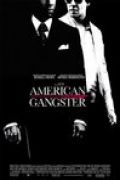
Directed by
Ridley Scott
158 minutes
Rated MA
Reviewed by
Bernard Hemingway

American Gangster
Synopsis: Harlem,1968. When black crime boss Bumpy Johnson dies his young protégé Frank Lucas (Denzel Washington) seizes the opportunity to take over Bumpy’s drug business. Frank is a smart business man – his idea: find the best quality product and sell it at the best price. And so he imports heroin direct from Vietnam using US military aircraft. When the streets begin to be flooded by Frank’s dope, “Blue Magic”, no-one in the police force dreams a black man could be behind it. But hard-nosed, honest officer Richie Roberts (Russell Crowe) gets wind of Lucas and is relentless in pursuing him as well as exposing his fellow cops’ complicity in the nefarious trade..
English-born Ridley Scott is one of the modern masters of American cinema and his film almost joins the pantheon of the most American of genres, the gangster movie, a pantheon that includes Coppola's The Godfather (1972) De Palma’s Scarface (1983) and Mann’s Heat (1995) and stretches back to William Wellman's The Public Enemy (1931).
“Almost” because although the film is tightly scripted by A-list writer Steve Zaillian (Schindler’s List,1993, Gangs of New York, 2002), is a top drawer production, sees Scott at his cinematic best and features compelling performances from Denzel Washington and Russell Crowe in working the tropes of the genre it doesn’t quite achieve an identity of its own.
The film's Achille's Heel is that Washington is too much Washington in charm mode, watchable as this always is, to convince as a ruthless thug, no more concerned by cold-blooded killing than he is growing rich from the misery and death that is ultimately his trade. Washington is so charmingly debonaire that we too easily forget what an illiterate thug Frank really is and neither Scott nor Zaillian seem to notice the contradiction.
There is a montage in which we see the reprehensible effects of Frank’s trade, so far removed from the life of luxury that he himself lives but the film’s final section in particular, in which he co-operates with Richie’s investigation into NYPD corruption and which shows the two men kidding around like old pals, effectively brushes all this under the proverbial. The implication is that Richie, who throughout the film is shown as being acutely aware of Frank’s immorality, has fallen so much under the latter’s spell that he has forgotten all about this. It may have been so (the film is based on real events) but as there is no scene of regret, let alone redemption, on Frank’s part it considerably undermines what has gone before. When you compare this resolution to any of the classics cited above it is easy to see what is wanting (one might also compare it to Training Day, 2001, in which Washington plays a crooked cop who pushes his luck too far)
Faring better, Crowe's character is given more depth, albeit in a very familiar way, although his accent hardly seems New Jersey enough and that as an overweight, badly-paid cop with evidently little regard for personal hygiene he would be such a pantsman is a borderline fantastic assertion.
American Gangster will not go down as one of the great instances of the genre but if this is your stamping ground, particularly the modern, graphically violent instance of it, you won't be disappointed.
Want something different?





